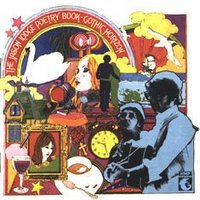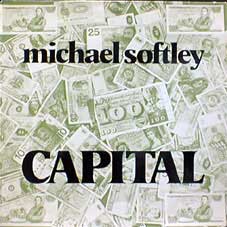Cochise
 Hugh Fielder:
Hugh Fielder:Cochise were formed in the heady musical atmosphere of 1969 - five young guys who'd been in other bands, shared similar musical interests and an enthusiasm to see if they could make it work together.
The seeds of the band had been sown a few months earlier when pedal steel guitarist BJ Cole (who was “desperate” to break out of the traditional country bands his choice of instrument had straitjacketed him into) was recruited into an English version of the Flying Burrito Brothers that was being assembled by soon-to-be-legendary manager Peter Grant. The band's putative singer was Stewart Brown who'd known Elton John when he was Reg Dwight growing up in Pinner and sung with him in Bluesology. “He looked Jim Morrison-ish and sounded good too,” recalls BJ.
“It was a good idea, but it never really took off and suddenly Peter Grant got overwhelmed by the success of Led Zeppelin.” As the impetus faltered, ex-Yardbirds singer Keith Relf came in and the project veered off towards Renaissance. BJ's involvement petered out but later he got a call from Stewart Brown who was now in a band being put together by guitarist Mick Grabham from Plastic Penny who'd had their Top Ten one-hit wonder early in 1968 with 'Everything I Am'. BJ saw the potential and Cochise was born, completed by Cambridge musicians Rick Wills on bass and Willie Wilson on drums.
They were taken on by Clearwater Productions, a management company/commune operating out of a Notting Hill bedsit that BJ describes as “a clearing house for stoned-out musicians”. Chief among them were a motley crew called Silver Hawkwind who were furiously training to become fully qualified space cadets. Others included Skin Alley, High Tide and Trees.
Cochise recorded some demos at Dick James Music's studios in New Oxford Street where they found Elton John doing the same and the Troggs making the infamous “Troggs Tapes” as well as some hit singles. Their demos came to the attention of Andrew Lauder, Head of A&R at the London offices of Liberty Records, who had recently signed High Tide.
“They weren't country rock, they were more rock with a bit of country,” remembers Andrew. “But what really interested me was what BJ Cole's steel guitar brought to it and how he used it in a rock context. Even in America there weren't many bands doing that. And they were all good players; they didn't accept any barriers at all.”
BJ Cole confirms the no-frontiers attitude. “I was very influenced by the first David Crosby album, but I was also influenced by the Love albums and the Beatles 'Abbey Road'. And Dr John's 'Gris Gris' album just blew me away.” They built up a reputation on the underground circuit and played at the first Glastonbury Fayre in 1970.
Cochise's debut album was recorded at Kingsway Studios in Holborn with the Pretty Things' Dick Taylor producing, although BJ remembers that, “He was not much more experienced than we were. We were all very green and probably very stoned as well. It's amazing it came out as well as it did.” Even so, BJ still cracks up every time he hears a Willie Wilson drum fill on the laid back, Crosby Stills & Nash-styled 'China' which is so laid back that it misses half the drums.
BJ, Stewart Brown and Mick Grabham all contributed songs although BJ says that Stewart's were head and shoulders above the others, describing the country-rocking 'Watch This Space' (also released as a single) and the languid, evocative 'Past Loves' as “the best songs we ever did”. There was also a slow, powerful version of Paul Simon's '59th Street Bridge Song' that was part of the band's live show.
Andrew Lauder remembers being in the studio “a fair bit. It was fun - they were making a record and we were helping them do it. The spirit of the time was such that if someone had a good idea you could say, 'Well, let's do it', because the amounts of money involved were not that serious. It wasn't as if we were making videos or anything. They pretty much had a free hand.”
Released in 1970, 'Cochise' featured an eye-catching cover by Storm Thorgerson of Hipgnosis. “The album had a real mood to it,” recalls BJ, “because we hadn't really gone out and interacted with the rest of the industry. There was a special magic to it and Stewart gave the band an identity that could have matured into something substantial.”
"Swallow Tales" 1971
 Hugh Fielder:
Hugh Fielder:Cochise's self-titled debut in 1970 had shown that their blend of rock with a range of country influences had potential to develop into something special. Formed by guitarist Mick Grabham from Plastic Penny with ex-Bluesology singer Stewart Brown, the distinctive pedal steel of BJ Cole and Cambridge musicians Rick Wills on bass and Willie Wilson on drums, Cochise had also forged a reputation on the underground circuit. They were turning their minds to the follow-up album when Stewart Brown suddenly announced he was leaving.
“His girlfriend came from a rich family and she persuaded him to quit the music business and move to the Mediterranean,” remembers BJ Cole. “He may have been getting disillusioned. After all, he'd been in other bands before Cochise and I think he may have just had enough. But it left us high and dry in terms of the direction of the band because he had the right voice and writing style to make all those country-style things work. Without him, it was going to be a different band.”
They auditioned for new singers and found John Gilbert who'd been working with Lancashire band Mighty Joe Young. His voice was heavier-sounding and that propelled the band in a similar direction - or Free-style as BJ describes it. “Not that it was a bad thing. I cranked it up and started playing more like a rock guitarist and using more sound effects.”
They were still adjusting to their new line-up when they started recording their second album at Philips' Marble Arch Studios. BJ recalls that they spent much longer on the album than they had on the first. “Nobody told us to stop so we just kept on going. Therefore we got more and more anal. A lot of work went into the harmonies. In fact a lot more precision work went on generally.”
The attention to detail certainly paid off, as did the decision to produce it themselves. The songs, now mainly written by Mick Grabham although BJ also had three, have a sharper edge to them. . Andrew Lauder, A&R chief at United Artists who'd signed them, was happy to indulge them not just because he believed in them but also because if they could produce the quality there was a chance of breaking the band in America. “It was still early days for country rock in America and the steel guitar gave the record company a tag to hang on to them. It was around the time of the Byrds' 'Sweetheart Of The Rodeo' and the Flying Burrito Brothers and there was a lot of enthusiasm from some of the younger guys in the record company for what I was doing with Cochise.”
They nearly had themselves a hit single too, with their version of Buddy Holly's 'Love's Made a Fool of You' which included Steve Marriott making a guest appearance on backing vocals. It got airplay on both sides of the Atlantic but not the momentum to take it into the charts. In retrospect BJ feels it was a turning point for Cochise. “I think if we'd gone to America at that point we'd have moved up another level. We were a band that could have appealed in America.”
But they didn't and the band stalled - although not before they'd made another album, 'So Far'. Meanwhile, 'Swallow Tails' is here to remind you what a lost gem Cochise were.
































